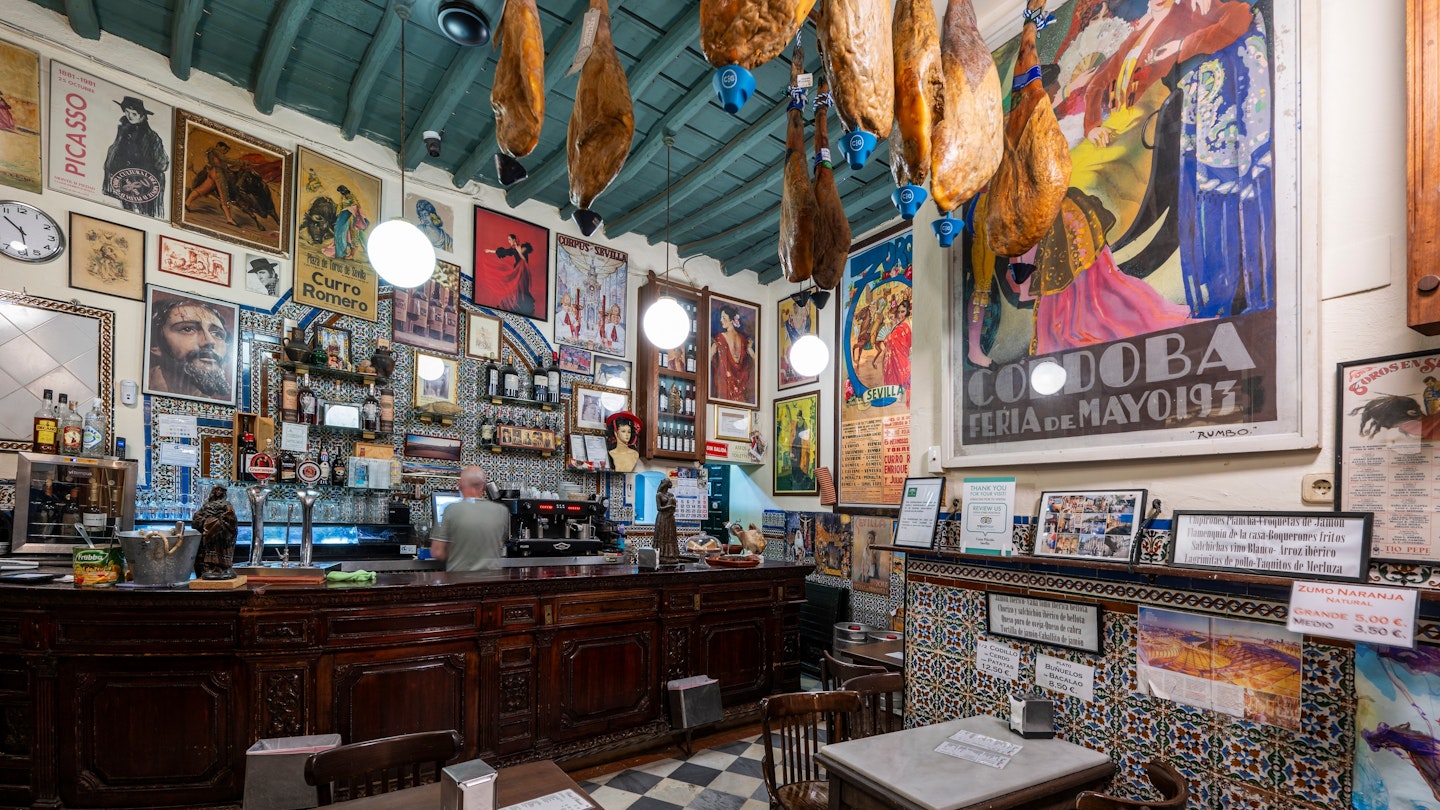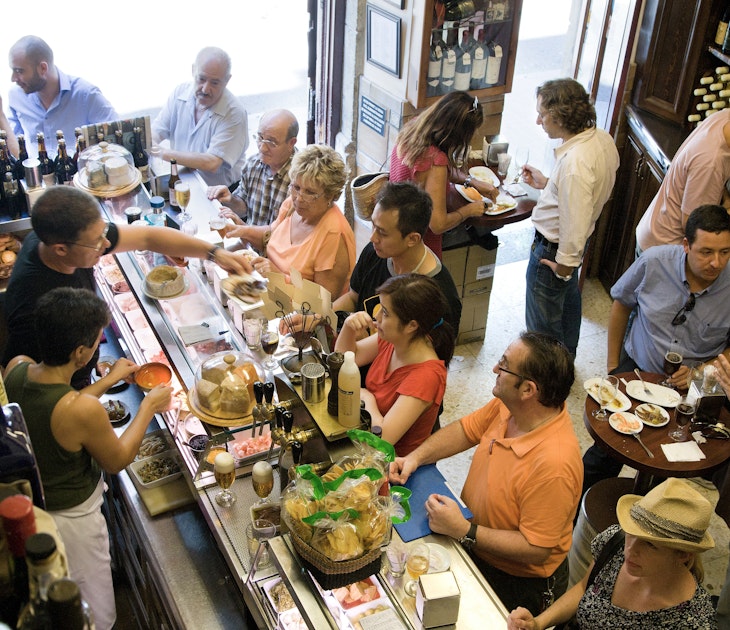
´¡²Ô»å²¹±ô³Ü³¦Ã²¹ is the home of tapas, one of Spain’s most famous cuisines. Tapas are essentially small plates of savory food. Originally, they were simple snacks served with drinks – a bowl of olives, perhaps, or a slice of tortilla – but over time, they have become increasingly elaborate. Historians have several theories about how tapas were invented, from King Alphonso XIII requiring food with his drinks because of an illness to placing a piece of bread and ham or a small plate of olives on top of a glass to keep out dirt and insects.
The word "tapa" means a lid or a cover, so it’s a plausible explanation. But, whichever one you believe, most people agree that it was in ´¡²Ô»å²¹±ô³Ü³¦Ã²¹ where the idea was first conceived. As the capital of the southern region, Seville is still one of the best places in the country to experience this culinary tradition. From the classic to the highly imaginative, Seville is the tapas queen.

1. El Rinconcillo
Having first opened way back in 1670, is the oldest bar in Seville and has been run by the De Rueda family since 1858. Today, it maintains its rustic charm with an antique wooden bar and ceiling, and colored ceramic tiles from the neighborhood of Triana lining the walls.
One of the bar’s stand-out dishes is espinacas con garbanzos (spinach with chickpeas), a classic Andalucian dish that was influenced by the Moors. It’s typically spiced with cumin, and sometimes pine nuts and raisins are also added, but the dish at El Rinconcillo goes above and beyond including coriander, ginger and cloves. It also uses a secret flavor from the bone of a leg of ham.
Make it happen: Open 1–5:30pm and 8pm–12:30am Mon, Wed and Fri–Sun; 1–5pm and 8pm–1am Thu. Reservations recommended.
2. Restaurante Donald
Located near the Museo de Bellas Artes, is covered from wall to wall in old posters and memorabilia. It first opened in 1973 as Bar Donald Duck, but after Walt Disney threatened to sue for the name, it was changed to simply Restaurante Donald. The bar is now owned by Mariano GarcÃa, who used to wait tables there.
Go for the award-winning Andalusian staple, ensaladilla rusa (Russian salad), which is a type of potato salad with added extras, including tuna, peas, carrots and pieces of hard-boiled egg and sometimes prawns, all smothered in mayonnaise. Ensaladilla rusa is served at almost every bar in the city and has become the litmus test for whether the other tapas dishes are good or not.
Make it happen: Open: noon–midnight daily.

3. FreidurÃa El Arrecife
is a true temple to seafood. Fishing nets hanging from the walls, alongside nautical-themed lamps and porthole mirrors. Seafood is an important ingredient in Andalusian tapas and there is nothing more quintessential than pescaÃto frito – a plate of battered fried fish and seafood.
This is one of the best places in the city to order it. The secret to this excellent seafood platter is that the fish is always fresh, never frozen, and brought in directly from the coast each day. New flour and oil are used every day. PescaÃto frito are cooked each morning before FreidurÃa El Arrecife opens for the lunch service and a new batch is cooked before the dinner service.
Make it happen: Open: 1–4pm and 8–11pm Tue–Thu, 1–4pm Sun. It’s just as popular for takeaways as it is for eating in.
4. Las Teresas
Located within the old Jewish neighborhood of Santa Cruz, near the Cathedral, is a Seville classic and dates all the way back to 1870. Legs of Âá²¹³¾Ã³²Ô (ham) hang from the rafters and ceramic tiles and old bullfighting posters decorate the walls.
The order of the day here is, of course, a plate of the cherry red Âá²¹³¾Ã³²Ô. It’s simple, but this is one of the most traditional tapas dishes eaten all over Spain. Las Teresas serves the prized Âá²¹³¾Ã³²Ô ibérico de bellota, a cured leg of ham made from pure-breed Iberian pigs who are fattened on acorns. Also worth trying is the morrillo de atún (grilled tuna neck).
Make it happen: Open: 10am–1am Mon–Sun. Tapas dishes can only be ordered at the bar, while the tables are for the larger °ù²¹³¦¾±Ã³²Ô±ð²õ. As it’s located in a very touristy part of town, it can get very busy, so come early.

5. Bar Estrella
Tucked down a tiny side street around a five-minute walk from the Catedral de Sevilla sits this small traditional ceramic-tiled bar dating back to 1939. At night it turns into a romantic spot with lamps lighting the tables that line the cobbled sidewalk.
One of prized dishes is its solomillo al whisky, slow-cooked pork in a whisky sauce. The dish was invented in the 1960s and since then has become a Seville essential found all over the city. Although it wasn’t invented in this bar, the solomillo al whisky at Bar Estrella – served on a bed of fries – has become a favorite for many. Other good dishes to order here include the Cabrales cheese croquetas with caballo de ángel (a sweet Siam pumpkin pulp) and the cola del toro (stewed oxtail).
Make it happen: Open: noon–midnight daily. Reservations are recommended, particularly if you want to dine outside.

How to eat tapas like a local in Seville
Tapas are made for sharing, and the idea is to order several different ones with a drink, such as a glass of wine or a beer. Remember, you don’t need to order all your dishes at once; you can order a couple and then order a couple more so that they don’t all come at the same time.
It’s worth keeping in mind that at some bars in Seville, tapas are only served sitting at the bar, which you’ll order directly from the bar staff. If you want to sit down and enjoy table service, a waiter will come and take your order. Often, you’ll be expected to order °ù²¹³¦¾±Ã³²Ô±ð²õ instead of tapas in this case. These are similar to tapas but are much larger and are best when you’re in a big group of friends or with family. If you’re a solo traveler or a couple, you’ll want to stick to tapas.
Meal times in Spain
Spaniards eat much later than in many parts of the world, and in ´¡²Ô»å²¹±ô³Ü³¦Ã²¹, it’s even later than the rest of Spain. Don’t expect to go out for dinner at 6pm as chances are that nowhere will be open. Most places open around 8pm, but you won’t find locals dining until at least a couple of hours later.
It’s also worth noting that Spaniards eat their main meal of the day at lunchtime. This will be a hot cooked dish, sometimes a menú del dÃa, which is a set three-course meal featuring a starter, main, dessert or coffee. Dinner is often lighter, such as small tapas dishes.
Explore related stories



 Cultural SiteSpanish agritourism: Rural experiences in La Rioja and beyondÂ
Cultural SiteSpanish agritourism: Rural experiences in La Rioja and beyondÂJul 12, 2024 • 9 min read

 Festivals & EventsSpain’s La Tomatina 2024: the fullest guide to the messiest festival
Festivals & EventsSpain’s La Tomatina 2024: the fullest guide to the messiest festivalMay 3, 2024 • 6 min read

 Tips & AdviceHere’s how to eat your way through Bilbao and Spain’s Basque Country
Tips & AdviceHere’s how to eat your way through Bilbao and Spain’s Basque CountrySep 22, 2023 • 6 min read

 Food and DrinkThe best restaurant in the world is closing. Why fine dining is becoming unsustainable
Food and DrinkThe best restaurant in the world is closing. Why fine dining is becoming unsustainableJan 12, 2023 • 5 min read

